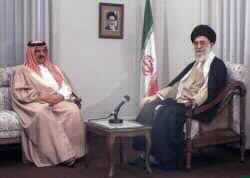AT top level meetings in Jeddah in Saudi Arabia where Crown Prince Abdullah Ibn Abdul Aziz received Yemeni President, Ali Abdullah Salih and in Tehran where King Hamad Ben Isa Al Khalifa made the first visit in decades by a Bahraini head of state to the Islamic Republic of Iran¸ Saudi Arabia, Yemen, Bahrain and Iran reiterated strong opposition to U.S. military action against Iraq. From Tehran the Bahraini monarch went on to Abu Dhabi where he had talks with UAE president Sheikh Zayid Ben Sultan Al-Nehyan who is also on record as being strongly opposed to Washington's policy towards Iraq.
Bahrain, a key U.S. ally in the Gulf region, joined Iran on Sunday in opposing American military action against Iraq. "Iran and Bahrain declare their determined opposition to any unilateral military action against Iraq," said a joint statement issued at the end of a two-day visit to Tehran by Bahrain's king, Sheik Hamad bin Isa Al Khalifa.
The statement, carried by the official Islamic Republic News Agency, called for respecting "Iraq's territorial integrity and noninterference in Iraq's internal affairs."
Bahrain is the headquarters of the U.S. Navy's 5th Fleet. The tiny island was a base for America to run supplies and other operations for the war in Afghanistan. Washington also has granted Bahrain major non-NATO ally status.
But the king's comments Sunday mark Bahrain's clearest opposition yet to the idea of American military intervention in Iraq.
Toppling Iraqi leader Saddam Hussein is a U.S. policy goal, and President Bush has raised the threat of a military assault to achieve it. Bush has said other tactics are also being considered.
Iran, which fought a war with neighboring Iraq from 1981 to 1988, repeatedly has opposed U.S. intervention.
In a meeting with Sheik Hamad, Iran's supreme leader Ayatollah Ali Khamenei said "any power planning to take action against the Islamic world today will definitely meet great problems," Iran TV reported.
Khamenei said "any incident in this region will be detrimental to those creating it," an apparent reference to the United States.
Dialogue and closer relations between Iran and its Arab neighbors would help stop American threats, he added.
"The U.S. president openly speaks of a crusade war. Under such circumstances, Muslim countries should get closer together and increase their cooperation," the television quoted Khamenei as saying.
The joint Iranian-Bahraini statement said both states would soon sign a security pact because "the two countries believe security for each was security for the other."
Sheik Hamad is the first Bahraini leader to visit Iran since the 1979 Islamic revolution. His visit reflects a significant improvement in ties after years of unstable and sometimes tense relations.
SAUDI ARABIA & YEMEN
In Jeddah, Yemen President Ali Abdullah Saleh and Saudi Arabia's Crown Prince Abdullah bin Abdul Aziz repeated their countries' opposition to any US invasion of Iraq during talks in Saudi Arabia on Sunday, the Yemeni ambassador to the kingdom said.
"The two leaders were in full agreement over all issues discussed," including opposition to the threatened US strike against Iraq, Khaled al-Akwa told AFP at the end of the official talks.
President Saleh left Saudi Saudi Arabia after the brief visit to the neighbouring kingdom, during which they also discussed bilateral relations.
On arrival, the Yemeni president also underscored the importance of negotiations for the return of arms inspectors to Iraq who were pulled out of the country in December 1998 on the eve of US and British air strikes.
Saleh's talks with Abdullah also focussed on the suffering of the Palestinian people after nearly 23 months of intifada.
The president of Yemen - a southern Arab peninsula state that forged close ties with America following the Sept. 11 terror attacks - said changing Iraq's regime is "the business of the people of this country."
PHOTO CAPTION
Iran's Supreme leader Ayatollah Ali Khamenei, right, talks with Bahrain's King Sheik Hamad bin Isa Al Khalifa during their official meeting in Tehran, Iran, Sunday, Aug, 18, 2002. Hamad arrived Saturday in a historic visit that both countries described as a "turning point" in their bilateral relations. Relations between regional powerhouse Iran and the tiny island nation of Bahrain were extremely tense in 1996 after Bahrain accused Iran of orchestrating a coup plot among its Shiite Muslims. A picture of Iran's late spritual leader Ayatollah Khomeini is on the wall. (AP Photo/Vahid Salemi)
- Author:
& News Agencies - Section:
WORLD HEADLINES


 Home
Home Discover Islam
Discover Islam Quran Recitations
Quran Recitations Lectures
Lectures
 Fatwa
Fatwa Articles
Articles Fiqh
Fiqh E-Books
E-Books Boys & Girls
Boys & Girls  Ramadan
Ramadan Fatwa Audios
Fatwa Audios Month of Mercy
Month of Mercy Women
Women Eed Al- Fitr
Eed Al- Fitr Food Recipes
Food Recipes Videos
Videos

 Prayer Times
Prayer Times












